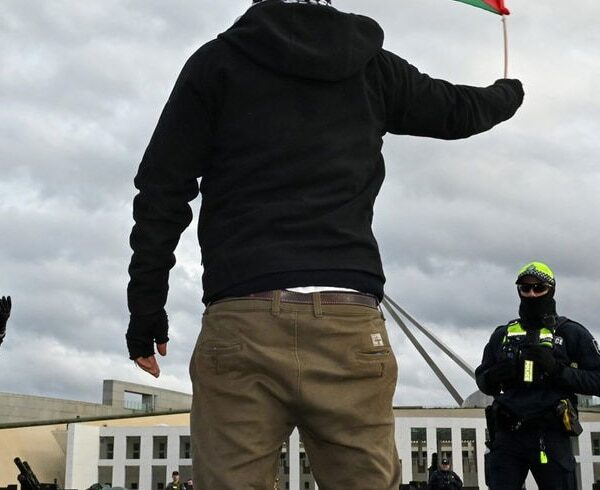
As the Israel Defense Forces continued to bomb crowded areas of Gaza City with heavy ordnance over the weekend, and bulldozers cleared roads to establish even more settlements in the West Bank, support at the United Nations for a two-state solution must have seemed something of a sick joke.
Israel is racing to ensure there is little physically left on the map to form the basis of a Palestinian state, but instead, as far-right finance minister Bezalel Smotrich said last week, the Gaza Strip could be a “real estate bonanza”.
“Any unilateral action can be met with unilateral action,” Israeli Prime Minister Benjamin Netanyahu said. “There will be no Palestinian state.”
So, is the move for Australia, and countries including France, the UK, Canada, Portugal and New Zealand in announcing support for a Palestinian state, worth as little as its critics suggest?
Ten-year-old Amina was fetching water when a missile strike killed her
Only three or four months ago, the idea that Australia would relent and recognise Palestine would have seemed impossible. The same is true for some of the other countries that have joined the cause.
In what many analysts call the ‘G minus one world’ (the world without the United States), national leaders are employing any possible lever they have to maximise pressure on both the United States and Israel to stop the war in Gaza.
To date, it feels like both countries have only dug in further.
The push for recognition is a last-gasp effort to keep the two-state solution idea alive, even if on life support.
Israel occupying Gaza City marks a shift in a blood-soaked, condemned war
Its value is based on the idea that neither US President Donald Trump nor Israeli leader Mr Netanyahu will be in power forever, and that at some point, the possibility of a two-state solution might yet emerge.
Australia’s position used to be that recognition would come at the end of finding a workable solution in Israel with the Palestinian people. It has now changed to one in which Australia’s position views recognition as part of the process of coming to a two-state solution.
It is now being used to give credibility to more Western countries that the proposal outlined in July, in what is known as the New York declaration, has serious and widespread backing.
The move to recognise Palestine
This declaration was last week endorsed by the UN General Assembly, 142 votes to 10, with 12 abstentions
It is a lengthy document, spelling out what must be done by all the parties to achieve what is hoped would become a lasting peace.
Australia’s decision to recognise Palestine is not just symbolic
Its terms were reflected in the statement released overnight by Prime Minister Anthony Albanese and Foreign Minister Penny Wong in announcing recognition of the state of Palestine, a position they say is “part of a co-ordinated international effort to build new momentum for a two-state solution starting with a ceasefire in Gaza and the release of the hostages taken in the atrocities of October 7, 2023”.
It then sets out the demands on the Palestinian Authority (PA), which is seen as the likely governing option despite its many faults.
The PA is being required to recognise Israel’s right to exist, and has given “direct undertakings to Australia, including commitments to hold democratic elections and enact significant reform to finance, governance and education”.
Terrorist organisation Hamas, the declaration says, must have no role in a state of Palestine.
The West’s actions are still falling short of real pressure on Israel
There are then further steps that will be considered, “including the establishment of diplomatic relations and opening of embassies, as the PA makes progress on its commitments to reform”.
The parties to the declaration say they are already doing crucial work “across the international community to develop a credible peace plan that enables the reconstruction of Gaza, builds the capacity of the state of Palestine, and guarantees the security of Israel”.
Pointedly, the Australian government statement notes that “the leadership of the countries of the Arab League and the United States of America is vital to this task”.
While many Arab countries have expressed shock and outrage about the situation in Gaza, they have to date not undertaken any major sanctions against Israel.
Equally, Mr Trump has made clear he is not interested in fighting a war over climate policy. But he likes to be seen to solve international conflicts.
Loading
A message for Israel
Israel is committing genocide in Gaza, major UN report finds
When they came up with their strategy for this meeting, the signatories to the New York declaration believed it would send the strongest possible message yet to both Israel and the United States that things have changed and that the tolerance, which has given Mr Netanyahu the confidence to continue his assault on Palestinians, is at an end.
International outrage about what is happening in Gaza has spread into growing trade sanctions, and to moves to impose sports and cultural blockades on Israel, too.
The rest of the world will be hoping the push on statehood for Palestine will up the ante on all these other forms of pressure while the world is gathered in New York and signal that the world is, finally, serious about showing Israel that its actions are intolerable.
Laura Tingle is the ABC’s global affairs editor.





